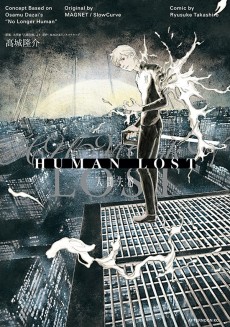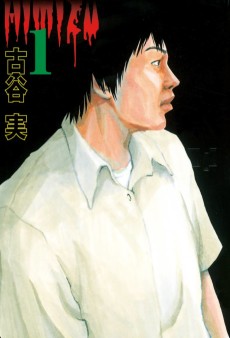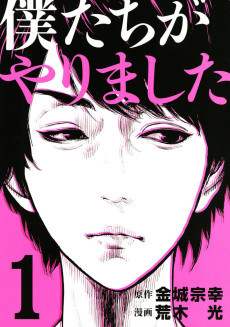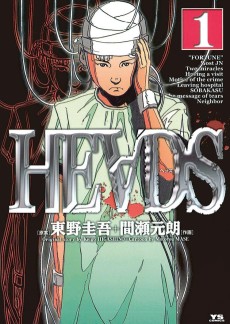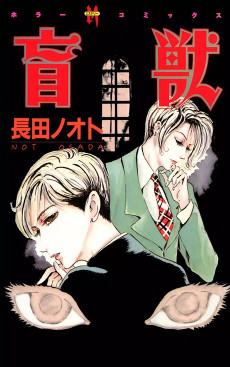NINGEN SHIKKAKU
STATUS
COMPLETE
VOLUMES
3
RELEASE
April 21, 2011
CHAPTERS
12
DESCRIPTION
Set in modern day Tokyo, Dazai's tale details the life of a young man originally from a well-off family from Japan's far north. Yozo Oba is a troubled soul incapable of revealing his true self to others. A weak constitution and the lingering trauma from some abuse administered by a relative forces him to uphold a facade of hollow jocularity since high school. The series is composed of three parts, referred to in the novel as "memorandums," which chronicle the life of Oba from his teens to late twenties.
(Source: Kodansha USA)
Adaptation of the original work of Dazai Osamu.
CAST
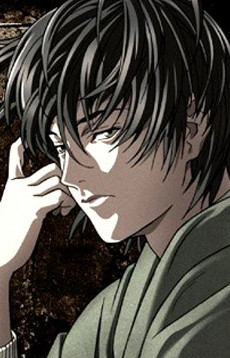
Youzou Ooba
CHAPTERS
RELATED TO NINGEN SHIKKAKU
 MANGA DramaNingen Shikkaku Kai
MANGA DramaNingen Shikkaku Kai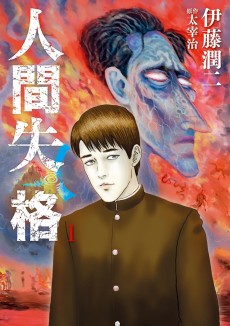 MANGA DramaNingen Shikkaku
MANGA DramaNingen Shikkaku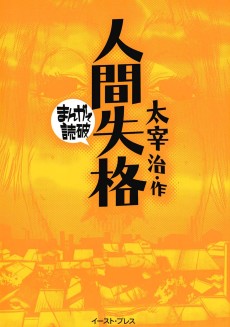 MANGA DramaNingen Shikkaku
MANGA DramaNingen Shikkaku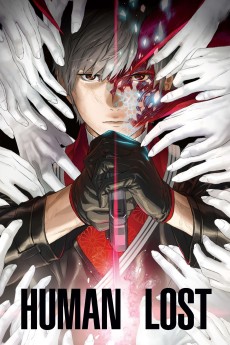 MOVIE ActionHUMAN LOST
MOVIE ActionHUMAN LOST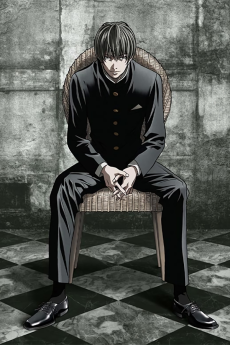 ANIME DramaAoi Bungaku Series
ANIME DramaAoi Bungaku SeriesREVIEWS

StorLucilfer
90/100The Ruinous Life of Yozo the ClownContinue on AniList
__To be Sick and Never Healed To be Lost and Never Found To be Broken and Never Fixed To be No Longer Human__

__Spoilers for the entirety of NLH__
Introduction: Ruin. The phantom killer of lives. It lurks in the background, waiting with open arms for you to enter its embrace. It stands with everyone, though many are fortunate enough to never see it, not fully anyway. We’ve all been down, some more than others, but have you ever felt so distorted that the world seems to spin? So confused that everything you thought you knew feels wrong? So alienated that all things feel foreign? Some of you may say yes, and that may be true. Though, true ruin is more than that. The path to ruin is a long and unsteady one, though positive things keep us from reaching its end. But what if those positive things never came? What would your life become without that saving grace? Only one word can truly describe it, and I’m sure you know it. You definitely know it. It is…
No Longer Human is a 2009 manga adaptation of the book by Osamu Dazai. By far his most popular work, at least outside of Japan; it has received multiple manga adaptations, one of which by Junji Ito, though the subject of this review is by Usamaru Furuya. It was a grim read - showing the very depths of despair and looking into the mind of a man lost even to himself. I’m not going to conform to the clichéd ‘I didn’t enjoy reading this but--’, because I did enjoy reading this. It is a well-written work, thus I enjoyed experiencing what it had to offer, notwithstanding its material. But, just be warned, this review will enter sensitive territory, so read at your own discretion.
General: Story
NLH is a short read; with twelve chapters – and those chapters being around forty pages – you can breeze through it in a single sitting, if you wish. That’s not to say the story is lacking though, as you’ll find it is incredibly dense and compact.As well as the actual story, there are small segments where the mangaka added himself in; it’s sort of a third person look on himself researching the story, within the universe the story is set. So, a story written by a man is being researched by another man, who in universe wrote the manga that I’m currently reviewing. That’s a thought.
The story is centred around Yozo Oba, a clown. Not the kind painted white and giving little children nightmares on their birthdays, but a conceptual clown. You may wonder what I mean by this, but I shall detail it more later. We follow his life – from his teens to late twenties – and it is not a pleasant life, not pleasant at all. A life of lies; a life of pain; a life of fear.
The narrative is mainly focused on Oba’s mind; pushed forward by introspective dives into the inner workings of his psyche. So, while there are no verbose internal monologues, there is a lot of psychological exploration – done so through being exposed to the thoughts and feelings of a damaged soul.
Oba is a product of his own fear and trauma – they are what shape his perception of humanity. Seeing his world view is disturbing and upsetting; knowing that he could have been better if not for his deep-rooted psychological issues and behavioural patterns.
One could compare the story to a rollercoaster, though not a rollercoaster of emotions. No, this story is more akin to a rollercoaster of despair; each slope a fleeting feeling of hope, a view of something better, each drop a plunge back into nightmare, no, back into reality.
Being witness to such a spiralling descent into chaos and disorder is equal parts unsettling and interesting. It lays so intimately with tragedy, hand in hand with disaster; painting a painful picture of twisted, melancholic humanity.
Yozo Oba
Oba is an interesting character to me. He’s relatively simple, all things considered. But there are certain aspects to his character that I really love, and that I think are really cool. I have split his character into three parts that I believe to be the culmination of his being: the façade, the parasite, and the entropy. They occur more or less in that order and encapsulate his development. Seeing this development unfold is a spectacle to say the least. This is also how I shall structure the proceeding part of this review; each shall indicate a certain period of his life and I shall analyse (or at least attempt to) the relevant characters and moments that occur during said periods.
Façade: Playing the Clown The Start of The Show -
Humans, like all other animals, are shaped by their environment. There are innate factors in play as well, of course, but the degree of one’s character is often the result of social stimuli. Oba is a creature created by this very phenomenon. He is a very naturally gifted individual; handsome, intelligent, and charismatic. He’s also rich – looking at him from a distance, you’d think he has everything one could ask for. But is he happy?He may seem happy. Hell, he may seem like the most carefree, happy-go-lucky man you’ve ever seen. But that is his mask, his guise, his façade. Oba’s father was an intimidating figure – constantly making demands, constantly reprimanding, constantly enforcing his own wishes and values. This distorted Oba’s definition of ‘ordinary’; everything he did was denounced by his own father with no real instruction on how else to be. As a consequence, Oba developed a deep fear of his father, and had to act around him, like giving a fake smile in a family photo. Thus, the façade began.
Our fathers are our primary role models, whether we like to admit it or not, how they act influences how we act. And in Oba’s case, his father’s intimidation and unreasonable demands warped his view of people and hard-wired the toxic trait of lying into him. Not in the sense of lying about your favourite things to impress someone, but in the sense of literally playing a character; wearing a mask to conceal your true self. This became him. It wasn’t just something he did occasionally, he was his fake self more than he was his real self, so much so that his real self was practically lost.

A Self-Indulgent Interlude -
The act followed him to his teenage years. School is somewhat of a partner to home; they are the two places that a person develops most; with their family, and with their peers. A child could have caring and loving parents, but a painful school life could push them to a dangerous state of mind. Oba may not have understood humans in their entirety, but he understood the mob mentality. Loners are pariahs – being liked is everything. This is where his façade came in. He feigned a sense of jocularity in school; acting as the class clown to win affection. He was intelligent, but he would deliberately get questions wrong in class so as not to appear ‘too’ smart and anger the jocks. Behind this act was nothing. He was an empty shell, a hollow husk of a person – performing for these humans for that is all he knows.Every performer needs a break from the stage though, and so Oba started attending an art class. Acting so jovial at school all the time tires the brain, at art class, Oba is free from that burden and can use the art as an outlet. Here, he meets Horiki, a man who you could say is the same and the opposite of Oba. Oba likes to observe him because he also plays the clown. The only difference is Horiki is not hiding anything with his act; he acts like he does purely for the fun of it. This contrast strikes Oba to the core – as he would find himself bound to Horiki more than he’d like to admit.
Horiki takes Oba to a brothel – assuming Oba must be a virgin due to his demeanour. Oba remarks that it isn't his first time and makes light work of charming his assigned girl and getting her number. According to him, he is more open at these places than anywhere else. He never lies, he never acts. As mentioned earlier, he is naturally gifted, and I think he finds natural things easier to understand and engage with. Sex is a natural process; a base urge, a near animalistic instinct to bond, to be one with another. Oba, who struggles to engage with his own life, finds pleasure in being able to physically join another in sex. It is such a simple process to him: enter; pay the toll; satisfy his needs; done. If only everything was that simple for him, perhaps he wouldn’t be so broken.

A Change of Stage -
First, his house, second, his school. Which stage awaited his performance next? Horiki dragged him to the ‘Japan United Labour Reform Association’, because a cute girl he met invited him. Oba once again plays a character; he’s rich but pretends to be poor and angry with the government for their indulgence in the American economy. While Horiki stops attending due to the radical views they hold, Oba slips into their upper ranks, merely because he finds them entertaining. Perhaps he finds joy in seeing people struggle with something he doesn’t. He internally mocks their cause; seeing them as the reason for their problems, as opposed to the government. Oba has expressed previously that he hates the fact that other people seem so happy – like they have no problems, no self-doubt, no pain. These people, however, are openly struggling and revolting against the source of their pain. This counters Oba’s method of dealing with his pain; he plays a role to be accepted, allowing him to engage with humans he fears. But he has never known disobedience. His father drilled subservience and conformity into him, so he has always followed the rules. The members of the reform group are unlawful misfits that completely contrast how he usually acts. Maybe that’s why he likes it – no actor wants to play the same role for their whole career.This whole situation, as well as his relationship with Horiki tackles the idea of ‘Nature versus Nurture’. The reform group is made up of honest and hard-working people, but due to the nature of their occupation, they’ve been unjustly laid off and left in poverty. Oba is the opposite of honest. He plays a character, and all of his actions stem from a desire to fit in and be accepted. And yet, he is wealthy and has all his resources provided for him. Why does he deserve that, while the labourers get unemployment? It is simply because of nature. Similarly, Horiki is, like Oba, a handsome man. He also frequents brothels and likes sex. Where do they differ? Their environment. Hiroki grew up in a caring household, developed ample social skills, and is, from what we can see, a happy person. He plays the clown because that is his personality. It is not a deceiving act like Oba’s; he does not need to hide pain and put on a guise to be likeable. He is likeable because that’s just how he is. And Oba fails to comprehend this. What truly decides your fate? What dictates your course as a human being? Naturally, Oba is incredibly gifted and envied by many. But he has many toxic traits and is miserable inside. His misery is due to his lack of understanding of human nature, which in turn was caused by his father. On the other hand, someone else’s misery could be due to their natural qualities, or lack thereof. It’s a near impossible debate to answer as humans are such complex beings.
His father was his model for what a man should be, and he was terrified of him. Consequently, he is terrified of humankind. This is why he plays the clown; he cannot comprehend what ‘ordinary’ means, so to fit in, he chooses to stand out. He is a puppet of his own façade, and that façade was a result of his father. His strings are still being pulled by that man he so fears.
His clowning is both a literal and metaphorical representation of depression. Literal because Oba is clearly depressed himself; his clowning is his way of communicating with the outside world. Metaphorical because, while not as pronounced and distinct, all depressed people clown to an extent. There’s a saying, or generally spread belief, that goes along the lines of ‘the one who laughs the loudest cries the hardest’. It has different forms and versions, but they all communicate the same message. Some are open about their depression, some may only tell those close to them, some keep it to themselves. Basically, you often can’t tell when someone is depressed, because they don’t act like it. They laugh. They jest. They smile, even if they don’t want to. For that is their mask, their guise, their façade.

Parasite: His Dark Genius Misaki, The Ugly -
Around this time, his life changes. His recent truancy had provoked his father’s ire, and he had his credit cards and apartment taken from him. Now living in a shabby apartment with little money to live on, he fell victim to hunger and a general lower quality of life. How ironic that for attending a group – whom he contemptuously held in little regard for having no jobs and being poor – he was now without income and a home. On the plus side, he would no longer need to act within the reform group, but this brought him no joy. In fact, this development brings about a different side of him. The parasite.Using his natural gifts, as well as his honed acting ability, he begins to seduce Misaki from the reform group, whom he had previously expressed disinterest in. He gave her attention, she gave him food, and even a new laptop (poor my ass). Oba has no integrity; his situation turns bad, and he begins to court a woman whom he would never even consider had he been well off. He went from a self-sufficient, wealthy individual, to living the life of a leech; sustaining himself off another’s money and care. He still has his urges though, and he makes physical advances after being bought the laptop. This was just another mistake however – the reform group leader shows up to his apartment, demanding entry. Realising he bedded the wrong woman, Oba flees the scene with his belongings, including the laptop she had just bought him. We never see what happens to her after that. Once Oba had got what he needed from her, he detached and left her with no care. This time, the parasite abandoned its host.

Ageha, The Bad -
Having lost his lifeline and the source of his allowance somewhat cut off, Oba wanders the streets under the rain. He struggles to find the word to describe his feelings. He next finds a pretty girl at a hostess club. He ends up getting money from her, but that is not all he finds. He finds comfort in her presence, for they are kindred spirits. He has finally found someone who he understands, and who could understand him. This is someone who isn’t there to just satisfy his monetary and physical needs – she may be the only one who can help him mentally and emotionally. Understanding is only part of helping someone, empathy is more important. Empathy is hard to find though, at least a natural and raw empathy that’ll connect with one’s own experiences. Ageha was that; Oba had found his solace. At this moment, he discovers the word he was searching for: forlorn, he feels forlorn.He realises he cares for her, and later they go to see the waves. Ageha’s hand was decorated with a butterfly tattoo. To keep her from feeling depressed, she said. But now, the very act of motioning her hand for the butterfly to flutter was tiring. This represents an oft-overlooked aspect of depression. Rather than a sea of bottomless sadness, it’s more akin to a void of any such feeling. The sadness comes more from that lack of feeling than anything else. We usually have hobbies and pastimes that stave off sadness, but what if those leisurely activities become boring? What if they brought no joy or pleasure? That’s exactly what Ageha feels, and that’s what her butterfly tattoo represents. An additional link is the similarity it holds to Oba's own situation. Ageha got the tattoo to combat her depression; Oba developed clowning to battle his unhappiness and confusion. And just how Ageha has grown tired of fluttering the butterfly, Oba too is tired of the façade. They truly are kindred spirits. She expresses that she doesn’t want to live anymore, and Oba irrationally suggests they should die together. Oba was tired of the act; tired of the same routine and made such a suggestion on a whim. They enter the sea, but he finds out he doesn’t actually want to die and ends up surviving. She was not so fortunate. He gave her the encouragement she needed to die, comforted her in knowing she would not die alone, but lost the will and left her to depart by herself anyway. It may not have been his intention, but he caused the death of Ageha. The first time he found someone who could understand him, who could help him, and he led them to death. This time, the parasite killed its host.


Entropy: Path to Ruin Karma’s Cold Embrace -
The beginning of the end. After running away from Shizuko, he had spent a while living in a bar under its proprietor. During this time, one could say he had undergone a metamorphosis of sorts. Contrary to what one would expect, he falls in love with the cashier at the smoke store, Yoshino. She was innocent and kind – always telling him not to smoke so much when he buys cigarettes and showing concern when he is drunk. It is not a lustful type of attraction either, but the kind of love you hear about only in fairy-tales. He would blush and mess up his words when he spoke to her (partly due to being intoxicated) and would even read the poetry she did. This is, as we’ve come to know, completely unbecoming of Oba. Prior to this point, he was living like a leech. But after he had sucked nutrients from the good, the bad, and the ugly, he has experienced some kind of evolution into a lover. Would this evolution stand the test of time though? To say this relationship moved quickly would be an understatement; after several interactions, most of which were of pretty short duration, they got married. Yeah, no need to make a long story short here. But, in spite of the haste, they seemed happy. Oba’s series was doing well, they had a nice home, and seemed to love each other a good amount. Oba and Horiki mutually scorned each other but had accepted each other as friends regardless. For the first time in his life, Oba was living honestly. However, this is just the top of the rollercoaster; a taste of happiness, a view of something better. But that’s not how this story is supposed to go. No, for Oba, the game was rigged from the start. Happiness was not in store for him.Oba was a genius at acting; Yoshino was a genius at trusting. To trust was her virtue, but it was to a fault. She knew no doubt, no suspicion, thus she knew no caution. While Oba was watching fireworks with Horiki, Yoshino, as it was her vice, recklessly let a man into the house for water. ‘Twas her fatal mistake, for this was no man – it was a beast swimming in her wake, ready to pounce, and pounce it did. Horiki, who had gone for a leak, came back white in the face. Oba followed him to the cause of his shock and was met with a sight most horrific. A depraved scene; his innocent wife was being defiled by Fukawa, his editor, who he believed to be harmless. As we find out later, in some twist of irony, Fukawa had recently been laid off, despite his contributions to the magazine. Earlier, Oba had played around with the reform group – a group of people who had been axed from their own jobs – because he thought it amusing. Now, one of those ‘misfits’ whom he could hardly take seriously, was assaulting his innocent wife in front of his very eyes. In one fell swoop, karmic retribution had been dealt, and it would kill him. This was the true beginning. The beginning of Oba’s descent. The beginning of his path to ruin.

Deathly Dark Descent -
Yoshino was understandably traumatised from this event and started covering herself up when she went out. She even cut her hair to stop people ‘looking at her like a woman’. The innocent genius at trusting was gone. The loving wife was not though; she desperately tried to get Oba to forgive her, as if she had done something wrong. For Oba, Yoshino was medicine to him; her lack of doubt alleviated his fear of humans, but this event completely shattered the image he had of her and everything else. His aversion to humankind had returned tenfold. It’s sickening but Oba was less bothered by the fact Yoshino had been raped than he was by her losing her innocent and carefree nature. It seems that even in that happy and stable relationship, Oba had some ulterior use for her; using her innocence to fix himself, while knowing her innocence would render her blind to it. Now that such innocence was lost, would their relationship hold? Oba’s misanthropy was back in full force; Yoshino had changed for the worse, in his eyes; and he was spiralling further and further into anger and depression.Oba was usually cold and calculated, but now, he would frequently lash out and have what could only be called tantrums. If he had gone from a dark genius parasite to a fairy-tale lover, he was now a frustrated child unable to regulate his own emotions. It’s difficult to truly label this though. He may be lashing out, and constantly angry, but is that not preferable to no emotion at all? Previously, he was devoid of feeling – only showing emotion so as to sustain the act. This was no longer a role; he was feeling genuine emotion for the sake of feeling genuine emotion. This should be a good thing, but it marks the lowest point in his life thus far. Makes you think, most of the bad things we do during our life are due to bursts of emotion. The mind is what makes us think, but the heart is what makes us move. This is for good, of course, but so can it be for ill. Would tragedy be such a big deal if we never felt sad? If something like this had happened while he was leeching, he would simply count his losses and leave to find another host. But this was not a host, this was a girl whom he loved, and Oba did not know how to process the emotions he felt at this time. Imagine being suddenly thrust into a new world full of unfamiliar senses, strange concepts, and foreign feelings. It would be terrifying. And Oba was terrified. The worst, however, was yet to come.

No Longer Human -
Following the incident, Oba’s hair turned completely white overnight. His brow gained a furrow. Physical changes caused by the stress? Sure. But these were just the start of his transformation, of his true metamorphosis. Oba had previously drank his problems anyway, but this was a special case, and he needed some heavy duty product. To his luck, or to his misfortune, he finds a new ally to aid him during this trying time. Drugs, speed to be specific. It helped somewhat with his emotions, at least in the sense of how he was affected by them. But it also gave way to mania and delirium. He began to suffer from hallucinations and delusions – creating a visual representation of his inner turmoil and trauma. His manga declines, and the new story ideas he puts forward are all utter nonsense. He lost his job, thus losing his income, thus losing his way of buying drugs. This, along with declining mental faculties, placed an increasingly caustic strain on his relationship with Yoshino. Like a beautiful flower; doomed to wither away and die – their relationship was cursed to die from the very start.He later finds out that his father had died. Good? Shouldn’t this have been a cause for celebration? The puppeteer was gone at last. The strings were cut. But no. This only means that the recent maelstrom of tragedy and disaster was not of his father’s doing, but his own. The puppet was free, but the puppet was broken. This fact just makes the next fact even more ironic. With his father’s passing, Oba got money due to the inheritance. He was trying to get off the drugs but now had all the money he needed to stay on them. One more strike from beyond the grave, to bring about his ultimate ruin. While he combats his drug-riddled mind, Yoshino suffers a miscarriage and finally can’t take any more. She tells her father, and he takes her away from Oba. Only in her absence, did Oba realise how much he cared for her. Crippled by rue and regret, he is haunted by remembrance of old faces and things past. In his prior forms, he never had the ability to comprehend his sadness to the full degree. Now that he has true emotions, now that he has abandoned the act, he feels the full extent of this nightmare that is his life. Now, what is left? His father is gone; there is no one to control him. The crowd is gone; there is no one for which to perform. The women are gone; there is no one for him to seduce. There is only him. He has no one and is, for the first time in his life, truly alone with himself. And it is Hell.

Conclusion: So, that was No Longer Human. I fear I may have gone overboard in places. I tried not to recount the plot too much but I’m only human. I feel it was somewhat necessary to communicate what I wanted to say. Anyhow, this manga was fantastic. It sports some of the best psychological exploration I’ve ever experienced. It was a gritty read, for sure, but that’s exactly the point.
If you haven’t read it, (not sure why you read this review if that’s the case, but you do you), and want a short but dense manga, then this is certainly an apt choice. I love the ideas used throughout; the three I highlighted herein summarise Oba’s character and journey fairly well.
Thanks for reading. This is my first review in a while so I may be a little rusty, but that just comes with the territory, I suppose.
'I wear a veil as he wore a face, for the same reason...
…The oldest reason there is for anything: To be accepted.'
SIMILAR MANGAS YOU MAY LIKE
 MANGA DramaHomunculus
MANGA DramaHomunculus MANGA DramaOyasumi Punpun
MANGA DramaOyasumi Punpun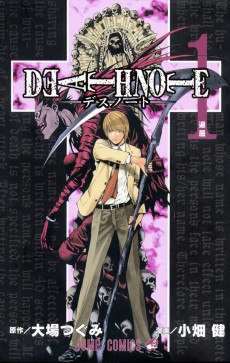 MANGA DramaDEATH NOTE
MANGA DramaDEATH NOTE MANGA DramaShounen no Abyss
MANGA DramaShounen no Abyss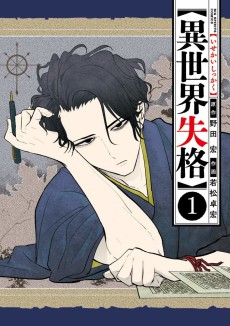 MANGA ComedyIsekai Shikkaku
MANGA ComedyIsekai Shikkaku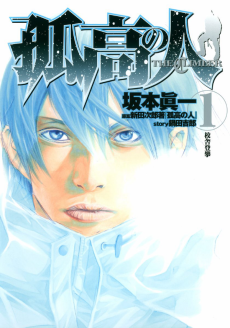 MANGA AdventureKokou no Hito
MANGA AdventureKokou no Hito
SCORE
- (3.85/5)
MORE INFO
Ended inApril 21, 2011
Favorited by 456 Users


